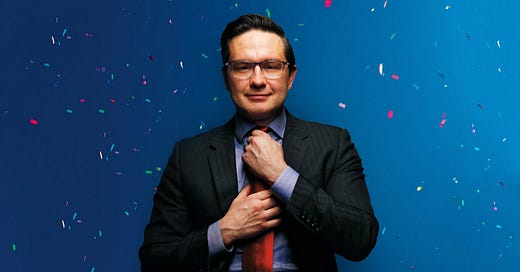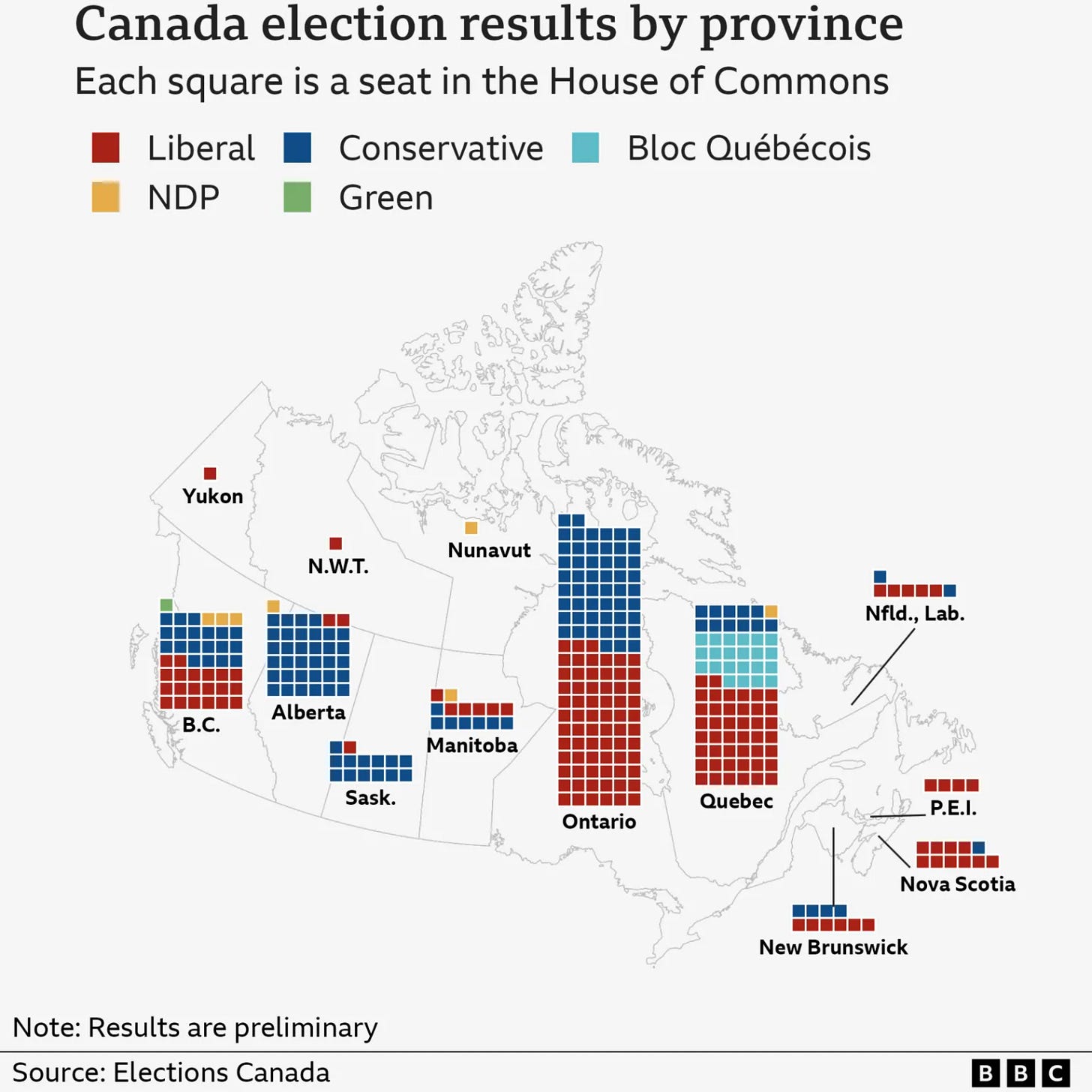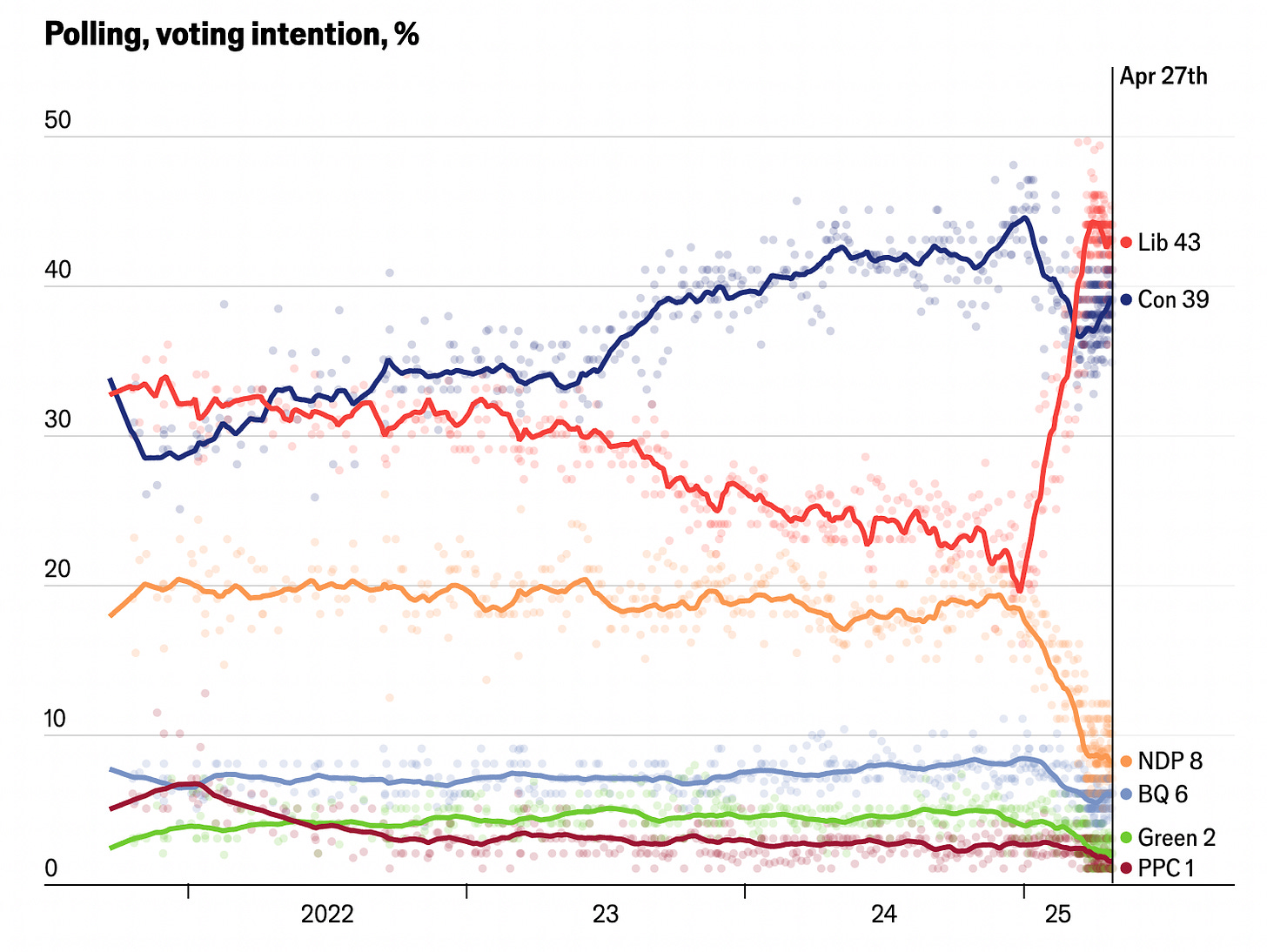The 2025 federal election was historic for a few reasons. First, the centre-left Liberals made a meteoric comeback from being projected to win just 20% of the vote at the start of 2025 to winning 43.7%—an astonishing amount that would normally deliver a huge majority of seats in Parliament. But since Canada has a ridiculous electoral system (first past the post + multiple parties), the Liberals were held to a strong minority government, three seats short of a majority.
This was paired with an unmitigated disaster for the left-wing New Democratic Party, which was reduced to six seats in the House of Commons and whose leader, Jagmeet Singh, came in third place in his own riding in Vancouver.
The more interesting story, however, is the ever-so-slightly-mitigated disaster of the right-wing Conservative Party, which fumbled even harder than the American Democrats in 2024. Their leader, Pierre Poilievre, lost his seat in the House, meaning that he can’t continue as leader of the opposition. He’ll try to remain leader of the Conservative Party, though that will be difficult for a few reasons.
Pierre Poilievre Is Cooked
Despite the Conservatives picking up 24 seats, I have trouble seeing how Poilievre will stay on as Conservative Party leader in the long run. Sure, he’ll stick around for a while and I wouldn’t be surprised if some loyalist MP out in Alberta gives him a seat, though it could take up to eight months for him to get into the House, since the Liberal government gets to decide when the byelection for that seat will be.
But the House of Commons is Poilievre’s natural habitat. How will he be able to farm Tiktok clips by calling the Liberals silly names if he’s not in Parliament? What is he supposed to do now that he’s not in the House? Go around knocking on doors and talking to Canadians? Nah, that’s not really Pierre’s thing.
The truth is that Poilievre and his annoying, caustic style of politics is a liability, not an asset, for the Tories. Consider this Angus Reid poll from right before the election, and in particular look at the bar on the left:

The Conservatives would have demolished the Liberals if it weren’t for Pierre! Let’s be honest with ourselves: Erin O’Toole would have cleaned up in this election. Canadians actually like the Conservative Party right now. The Tories won more votes than the Liberals in 2019 and 2021, despite losing in the seat count. And even young Canadians prefer the Tories. Canadians are frustrated with crime, the high cost of living, and immigration—and rightly or wrongly (mostly wrongly), they blame the Liberals for all of Canada’s problems.
But Poilievre refused to significantly change his strategy after Carney became Prime Minister and it was clear that the election had shifted from domestic issues to being mostly about Trump and who could best stand up to him. It didn’t help Poilievre that tons of NDP voters held their nose and voted for Carney, even though he’s effectively a Red Tory.
A few more reasons Poilievre is cooked:
There are large fissures on the Canadian right that mirror the divide between the modern Conservatives’ parent parties: Reform and the Progressive Conservatives. Consider the rift between more right-wing federal Conservatives like noted-best-friend-of-JD-Vance Jamil Jivani and Leslyn Lewis (who “accidently” met with an Alternative für Deutschland politician) and more moderate provincial premiers like Doug Ford in Ontario and Tim Houston in Nova Scotia (whose provincial parties are still called “Progressive Conservative”). Poilievre will have a hard time uniting the MAGA-adjacent Tories with the small-c conservatives.
Also, Poilievre has less influence over his MPs, now that he holds fewer carrots or sticks. It’s harder for him to keep caucus members in line via funding allocation and committee appointments, now that he’s not in Parliament. And he used to be able to entice MPs with cabinet positions . . . not so much anymore.
Most importantly, Poilievre forgot two of
’s rules of Canadian Politics:The candidate in the best mood—clearly Mark Carney—wins.
The candidate who auditions for opposition leader—Poilievre’s raison d’être—gets the job. (Though he didn’t even get that job! The point of this rule is that if you don’t act prime-ministerial, you don’t get to be prime minister.)
What Next?
It’s impossible to predict the future in Canadian politics, as was made clear by the last few month. Perhaps Poilievre will stick around. Maybe the Conservatives are sick of having to find a new leader whenever the Liberal prime minster decides to renew his mandate.
Poilievre will probably have a while to rebuild after this embarassing defeat, given that all three opposition parties would need to unite to bring down the government. Carney can pretty easily pass legislation by courting individual parties on specific issues. Want to bolster social programs? The NDP will support it. Want to drill more oil or cut taxes? The Tories will support it. Want to do anything else? Just throw in something special for Québec and the Bloc will support it. In any case, the Bloc has already announced that it will cooperate with the Liberals for a year, and the New Democrats are in no hurry to push for an election given that they hardly exist anymore.







I have a crazy theory that if the Tories want to win an election ever again they’re going to need to un-unite the right and splinter into a true blue party that runs in the west and a progressive conservative party for the east and then try to govern as a coalition. Because frankly I don’t think O’Toole would have won this election! He lost against Trudeau who had at best middling popularity in 2021 — I feel like people now certainly like Carney more than they liked Trudeau then.
Predictions:
The members of the conservative party will trigger a leadership review: 95%
PP will either step down or be voted out: 80%
The conservative party will split: 65%